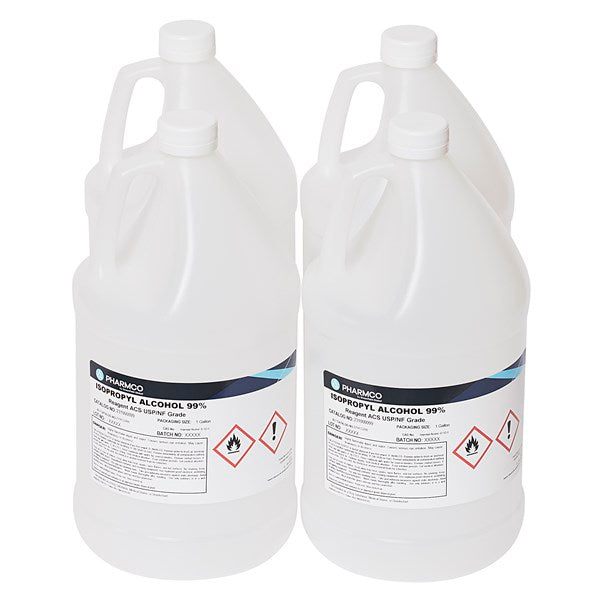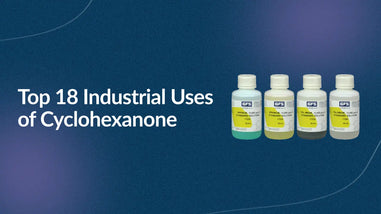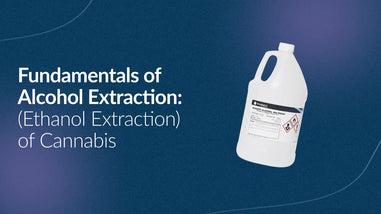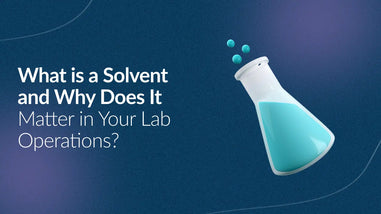- No products in the cart.
Effective disinfection is a critical aspect of maintaining a clean and hygienic environment, whether it's in healthcare settings, laboratories, manufacturing facilities, or even our homes. When it comes to alcohol-based disinfectants, two primary options stand out: Ethyl Alcohol (Ethanol) and Isopropyl Alcohol (IPA). Both are widely used for their potent germ-killing properties, but choosing the right one requires careful consideration. In this blog, we will explore the key factors to help you make an informed decision when selecting between Ethyl Alcohol and Isopropyl Alcohol for effective disinfection.
Ethyl Alcohol
Ethyl alcohol, is the type of alcohol found in alcoholic beverages. It is also used in many commercial products, such as hand sanitizers and disinfectant wipes. Ethyl alcohol is effective against a wide range of microorganisms, including bacteria, viruses, and fungi. It is also relatively inexpensive and easy to use.
Isopropyl Alcohol
Isopropyl alcohol is a clear, colorless liquid that is also commonly used as a disinfectant. It is similar to ethyl alcohol in terms of its effectiveness against microorganisms. However, isopropyl alcohol is more volatile than ethyl alcohol, which means it evaporates more quickly. This can make it less effective for disinfecting surfaces that are not porous, such as countertops and tables.
1. Efficacy
Both ethyl alcohol and isopropyl alcohol are effective disinfectants. However, there are some factors that can affect their efficacy, such as the concentration of the alcohol, the type of microorganism being targeted, and the surface being disinfected.
In general, a higher concentration of alcohol is more effective at killing microorganisms. However, too high of a concentration can be irritating to the skin and eyes. The type of microorganism being targeted also matters. Some microorganisms are more resistant to alcohol than others. For example, spores are more resistant to alcohol than vegetative cells.
The surface being disinfected also matters. Alcohol is more effective at penetrating porous surfaces than non-porous surfaces. This is because alcohol can evaporate more easily from non-porous surfaces.
2. Concentration: What's the Right Strength?
The concentration of alcohol is a crucial factor. For Ethyl Alcohol, concentrations ranging from 60% to 80% are typically effective for disinfection. Isopropyl Alcohol, on the other hand, is commonly used at concentrations between 70% and 99%. The right concentration depends on the specific application and the microorganisms you need to target.

3. Safety
Both ethyl alcohol and isopropyl alcohol are flammable. They should not be used near heat or open flames. Both alcohols can also be irritating to the skin and eyes. It is important to wear gloves and eye protection when using either alcohol.
4. Compatibility: Materials and Surfaces
When choosing between Ethyl Alcohol and Isopropyl Alcohol, consider the compatibility with the materials and surfaces you intend to disinfect. Ethanol is less likely to damage plastics and some sensitive electronic components. IPA, while generally safe for most surfaces, can sometimes affect certain plastics and rubber materials.
5. Regulatory Considerations: Compliance and Approval
Different industries and regions may have specific regulatory requirements for disinfectants. Ensure that the alcohol-based disinfectant you choose complies with the relevant regulations and standards in your area. Ethanol is commonly used in pharmaceutical and food industries, while IPA is prevalent in healthcare and cleanroom settings.
Choosing the Right Alcohol
The best way to choose the right alcohol for disinfection purposes is to consider the factors mentioned above. If you are unsure which alcohol to use, it is best to consult with a healthcare professional or a professional cleaner.
Here are some additional tips for choosing the right alcohol for disinfection:
- Consider the type of microorganism you are trying to kill. Some microorganisms are more resistant to alcohol than others.
- Consider the surface you are trying to disinfect. Alcohol is more effective at penetrating porous surfaces than non-porous surfaces.
- Consider the safety of the alcohol. Both ethyl alcohol and isopropyl alcohol are flammable and can be irritating to the skin and eyes.
- If you are unsure which alcohol to use, consult with a healthcare professional or a professional cleaner.
Conclusion
Both ethyl alcohol and isopropyl alcohol are effective disinfectants. The best way to choose the right alcohol for disinfection purposes is to consider the factors mentioned above. By following these tips, you can ensure that you are choosing the right alcohol for the job and using it safely and effectively.
For over 40 years, Lab Pro Inc. has been committed to delivering highest quality lab chemicals, lab supplies, hand tools, lab equipment, reagents, distance learning kits, and cleanroom PPE apparel. Renowned by global medical device companies and laboratories, we ensure exceptional quality in every product. Contact us online or call 888-452-2776 to learn more. Discover top-notch lab supplies and elevate your experiments today!












































